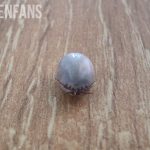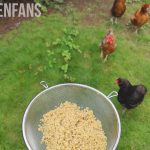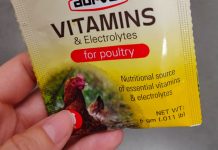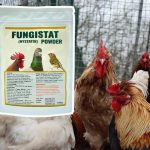Can Chickens Eat Oranges? (Dark Yolks)
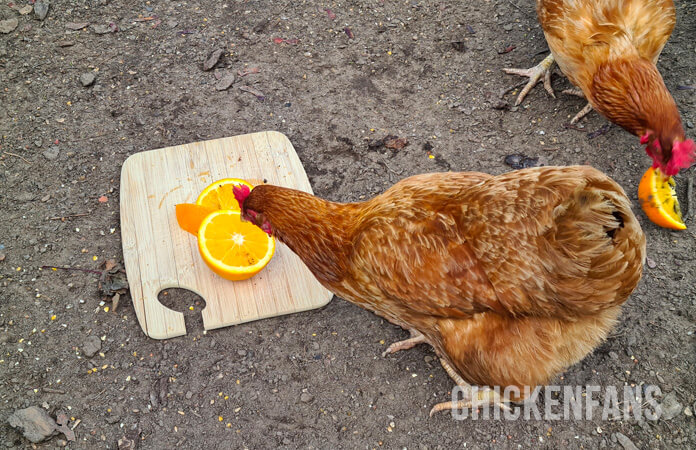
Oranges are a great treat for chickens in the summer. They are healthy, but high in sugar. We discuss the pros and cons of oranges for your flock and examine whether they can darken egg yolks.
- Can Chickens Eat Oranges?
- Nutritional Value of Oranges for Chickens
- Health benefits of Oranges for Chickens
- Risks of feeding Oranges to Chickens
- Can Chickens Eat Orange Peels?
- Orange Peels for Darker Egg Yolks
Can Chickens Eat Oranges?
Chickens can eat oranges as an occasional treat. Oranges are high in sugar and acidic; they can’t replace regular food. However, they are rich in vitamin C, folate, and lycopene and will boost your chicken’s health and immune system. Orange peels also darken the egg yolk.
Nutritional Value of Oranges for Chickens
Like most fruits, oranges are mainly water contained in fiber and carbs. They contain very little protein and fat, and most carbs are sugar.
| 1 Navel Orange (140g) | Amount | % DV Laying Hen |
|---|---|---|
| Calories | 73 kcal | ~25% |
| Water | 121 g | – |
| Protein | 1.27 g | ~7% |
| Carbs | 16.5 g | – |
| Sugar | 12 g | ~40% |
| Vitamin C | 82.7 mg | ~80% |
| Folate (Vitamin B9) | 35 µg | ~4-8% |
| Potassium | 161 mg | – |
| Calcium | 18 mg | ~ 0.5 % |
Oranges are rich in vitamin C and also hold some folate:
- Vitamin C – an antioxidant, vital for tissue growth and blood vessels and involved in many body functions and proper functioning of the immune system
- Folate – is also known as vitamin B9. It’s used for cell growth, red blood cells, and DNA repair.
The folate levels are not that high, a full orange provides only 4 to 8 percent of the daily intake for an adult Leghorn pullet. However, every milligram helps as a chicken’s body can not make folate.
Oranges also contain traces of other micronutrients, including potassium, calcium, a vitamin B complex, flavonoids, and carotenoids like lycopene.
Health Benefits of Oranges for Chickens
Providing your chickens with some orange leftovers can boost their health in several ways.
- It keeps the chickens hydrated: chickens need water to regulate their body temperature; water also plays a vital role in digestion and organ functions.
- Boosts the immune system: vitamin C is a powerful antioxidant that helps to protect cells from oxidative damage. It also helps the immune cells replace old ones with new, healthy ones.
- Improves heart and blood: vitamin C, flavonoids, and carotenoids reduce the risk of heart disease. They also help to control iron levels in the blood, reduce cholesterol levels and protect against any blood pressure-related diseases.
- May prevent cancer: lycopene combats excessive cell growth in certain forms of cancer; multiple studies suggest citrus fruits reduce cancers in the respiratory and digestive systems.
Sugar aside, oranges can be a healthy refreshing treat for your flock in the summer.
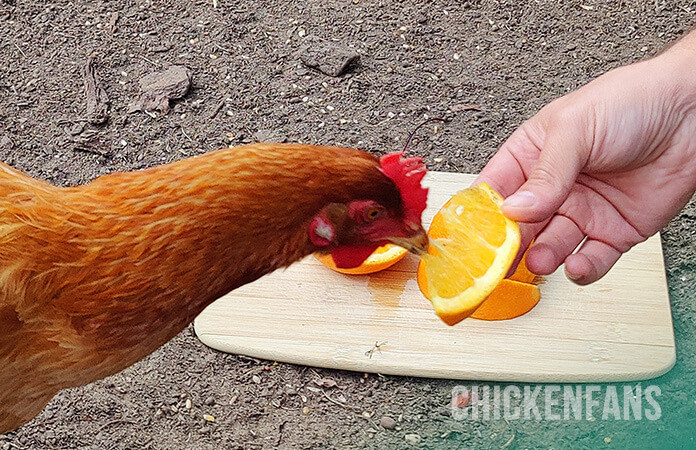
Risks of feeding Oranges to Chickens
Oranges are a treat and can never replace regular feed. Overfeeding oranges comes with a couple of risks for health conditions.
- Sour Crop: the high sugar concentrations in oranges increase the risk of Candida infections. Chickens store food in their crop when they eat. High sugar concentrations speed up the fermentation process and boost yeast growth.
- Hyperglycemia: a condition where blood sugar levels are high. Hyperglycemia causes high blood pressure, inflammation, weight gain, diabetes, liver problems, and many other diseases.
- Stomach upset: oranges contain citric acid, and their acidity sits in the 3-4 range. This is close to the acidity in the chicken’s stomach or proventriculus. Food is digested in the chicken’s stomach at pH 1.5–3.5. Too many oranges can upset their stomach.
- Mold: only feed fresh oranges that you would eat yourself. Molds are dangerous for chickens, affect their digestive system, and can cause dangerous infections.
About 50% of the sugar in oranges is sucrose. Glucose and fructose each take about 25%. They all have a high glycemic index that spikes the chicken’s blood sugar. Avoid orange juice or any processed oranges, as they contain even more fast sugars.
Can Chickens Eat Orange Peels?
Chickens can eat orange peels as long as they are properly washed, clean from pesticides and mold, and cut into small pieces so they can’t obstruct the crop. The peels are usually unappealing to chickens as they taste bitter and have a tough texture.
The skin has a dense fiber content, which gives it that rough texture. About 25% of the peel are fibers. For our stomach and intestines, it’s hard to digest, but chickens have fewer problems with digesting plant-based fibers.
The peel contains fewer sugars and much more vitamins. For example, 100gr peel will provide 15% of the Daily Value of vitamin A for an adult leghorn pullet.
Orange Peels for Darker Egg Yolks
The color of the egg yolk is largely the result of what a chicken eats. When chickens eat yellow corn, the yolk is yellow. When they eat orange marigolds, the yolk turns to the orange range.
The pigments in the food make it all the way to the egg yolk. The yellow-orange pigments are xanthophylls, and orange peels are a source of xanthophylls.
That’s why researchers started to look at whether adding orange peel supplements to a chicken’s diet could affect the yolk. They use the Roche Yolk Colour (RYC) score to measure the orange in the yolk.

Adding 4% of orange skin to the chicken’s diet produced eggs with a yolk score of 5. However, chickens that got marigold could lay eggs with a color score of 11. So, oranges will darken the yolk a bit, but marigolds are much more efficient for egg yolk pigmentation.
Other Reads
Other fruits:
- Watermelon – discusses watermelon flesh, rind, and seeds
- Bananas – learn about the health benefits for chickens
- Mango – we discuss whether chickens can eat sweet mango
- Strawberries – power food for humans, but what about chickens?
- Grapes – the pros and cons of feeding grapes to chickens
Some frequently asked questions:
- Can chickens eat and taste spicy food – here, we discuss the taste of chickens
- Can chickens eat onions – the risks of feeding onions and their use as poultry supplements
- Can chickens eat chocolate – several variants of chocolate are toxic to chickens
Some articles we mentioned here:
- The chicken digestive system – how chickens digest their food
- The chicken respiratory system – how chickens breathe and why it’s so different from how we breath
If you want to learn more about chicken feed, please consult our ‘Chicken Food Page‘ to go and see every specific food article we address, including all articles on what chickens can and can not eat. Or go to our listicle food summary on ‘The Classroom‘.


